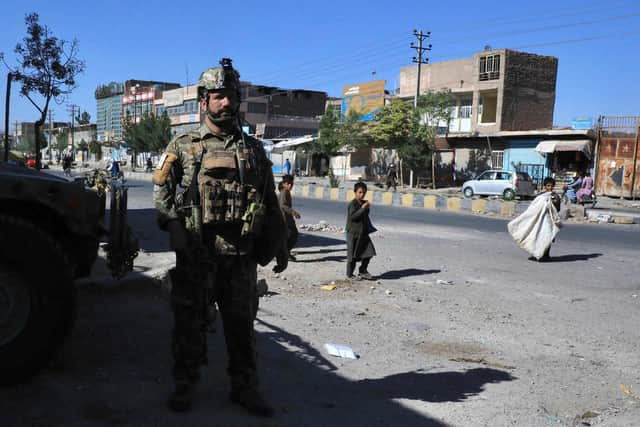UK troops deploy to Afghanistan to help Britons flee
The additional military personnel will arrive in Kabul over coming days, after the Foreign Office changed travel advice on Friday to recommend all British nationals leave Afghanistan as soon as possible, while commercial travel options remain available.
Defence secretary Ben Wallace said: “I have authorised the deployment of additional military personnel to support the diplomatic presence in Kabul, assist British nationals to leave the country and support the relocation of former Afghan staff who risked their lives serving alongside us.
Advertisement
Hide AdAdvertisement
Hide Ad“The security of British nationals, British military personnel and former Afghan staff is our first priority. We must do everything we can to ensure their safety.”


The head of the British armed forces had earlier warned a dangerous "security vacuum" risked opening up in Afghanistan, potentially enabling international terrorism to take a grip once again.
As the Taliban continued to make sweeping gains, seizing another provincial capital, General Sir Nick Carter said the country was already facing a "humanitarian tragedy".
The Taliban has seized the cities of Ghazni and Herat. The militant organisation has now taken control of 11 provincial capitals in less than a week following the withdrawal of international forces led by the US.
Around 4,000 British citizens are estimated to still be in Afghanistan.
Deployed UK troops are set to provide protection and logistics support for the relocation of UK nationals, as well as helping Afghan interpreters and staff to relocate to the UK as soon as possible.
Gen Carter suggested the best the government of President Ashraf Ghani could hope for was to achieve a "military stalemate" that would enable it to negotiate a political compromise with the militants.
"I think we have already got a humanitarian tragedy,” he told the BBC.
"The question now is whether it gets worse or not.
Advertisement
Hide AdAdvertisement
Hide AdGen Carter, the Chief of the Defence Staff, said it was a "fair assessment" that fighters affiliated to al Qaida were among the Taliban insurgents.
"If we end up with a scenario where the state fractures, and you end up essentially with a security vacuum, then there are absolutely ideal conditions for international terrorism and extremism to prosper yet again," he said.
It was the launch by al Qaida of the 9/11 terror attacks on the US in 2001 that led to the original international military intervention in the country.
With the Taliban again on the advance, Gen Carter said they were seeing many of the atrocities on the battlefield which they had been associated with in the past.
"We are seeing atrocities being committed, we are seeing war crimes being committed, we are seeing women being brutalised, we are seeing forced marriages – all the sorts of things that the Taliban were notorious for in the past," he said.
Despite the recent setbacks, with warnings the capital Kabul could fall within weeks, Gen Carter said he believed the government forces were still capable of holding on to "those bits of the country that really matter".
At the same time he said there was a "big disparity" between the actions of some Taliban fighters and the rhetoric of the movement's political leadership, based in Qatar, which, he suggested, could be open to political compromise.
"Do the Taliban really want to become a pariah state again? I'm not sure that they necessarily do. I think that they don't want to become North Korea," he said.
Advertisement
Hide AdAdvertisement
Hide Ad"Whatever may happen, there surely has to be a political compromise. Whether that means a Taliban government, whether it means a government in which power is shared – that remains to be seen.
"It very much depends in the next few weeks on that battlefield.
"But if a military stalemate is achieved by the current Afghan government and the people of Afghanistan are defiant and unified behind that effort, there is no reason to suppose that you can't end up with a political compromise which works for the majority of Afghans."